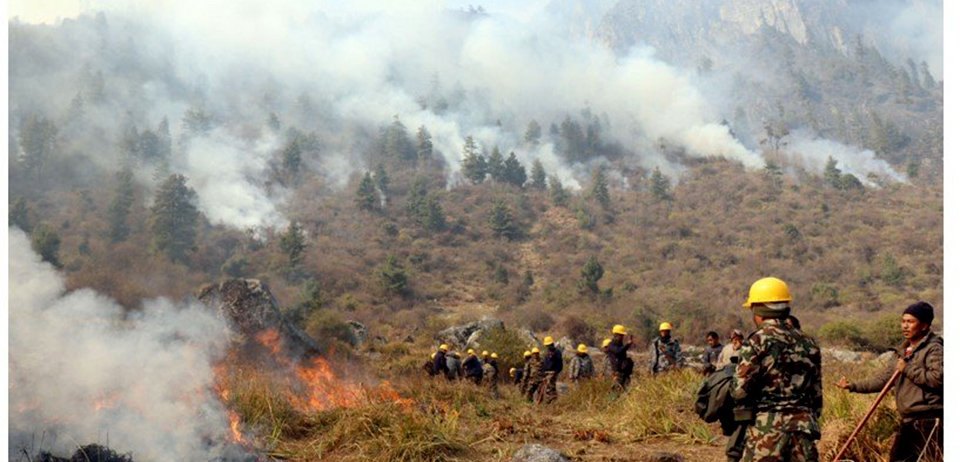Rising wildfire incidents call for effective response

By Shiv Kumar Kashi/Nayak Paudel, Hetauda/Kathmandu, Mar. 27: On Friday morning, residents of Hetauda woke up to a strange sight. Dawn resembled dusk as smoke from smouldering wildfire enveloped the city and several places across Makwanpur district.
The forest fire broke out in the Hariyali Community Forest at Ward No.1 of Manahari Rural Municipality in the district on Thursday. The blazing inferno quickly spread out burning everything in its wake while also spreading to human settlements.
Lal Bahadur Syangtan, a resident of the Rural Municipality simply watched in disbelief as the fire reduced his house to ashes.
Likewise, another wildfire in Balpang Forest in Ward No. 7 of Kailash Rural Municipality of Makwanpur on Thursday also stretched to human settlement – destroying the house of Man Bahadur Chepang and shed of Sujan Chepang.
According to the Nepal Disaster Risk Reduction Portal of the government, 35 incidents of household fire were recorded across the country along with over 400 wildfire incidents on Thursday alone.
As per the information provided by the National Disaster Risk Reduction and Management Authority (NDRRMA), the resources available to contain fires are currently inadequate in the country, which has further exacerbated the risk to life and property.
In the last one month alone, 29 wildfire incidents have been recorded in the community forests under Division Forest Office, Rapti Manahari, which has destroyed over 975 hectares of forest.
“The temperature has increased this year compared to the previous one due to which wildfire incidents have surged. Forest officials, security officials and locals are trying to control the recent wildfire but to no avail. They are unable to go even near the fire due to the intense heat,” said Dirgha Narayan Koirala, forest officer at Rapti Manahari Forest Division Office.
Five houses gutted in Bhojpur
The resulting fire also gutted five houses in Bhojpur on Thursday. The wildfire from Khangchimma National Forest had expanded to the community forest and reached the settlement at Ward No. 8 of Hatuwagadhi Rural Municipality.
According to the Area Police Office, Ghodetar in Bhojpur, they had cleared dry leaves and grass and even made a barrier in between the forest and settlement. But the efforts didn’t yield many results.
The fire reached the residence of a local Shanta Kumari Rai, which then further expanded to four other houses.
The house of Shivraj Ale Magar in Ward 1 of Barahapokhari Rural Municipality in Khotang was also destroyed by fire on Thursday after the wildfire in Raktamala Community Forest.
Similarly, the wildfire in Devsthan Community Forest on Thursday had also engulfed the settlement at Ward No.1 of Lamahi Municipality and destroyed the house of Keshar Bahadur Sarki.
In the incidents where the wildfire reached the settlement, authorities involved in extinguishing the fire admitted to not having quality equipment in preventing the fire from escalating. They further argued that extinguishing wildfires are, in fact, herculean tasks requiring a lot of resources.
“There are several aspects related to wildfire and the government must have its authorities prepared to tackle this disaster before it creates more damage,” said Balram Bhatta, dean at Faculty of Forestry of the Agriculture and Forestry University in Hetauda.
Responses have improved
While the lack of resources has made it difficult to control forest fire, the government authorities have, of late, improved their responses and have started maximising resources, equipment, manpower and technologies in a more structured way.
“We are now connected with local and provincial levels, including their officials and security divisions in order to make a quick response to disasters like a forest fire. In the case of wildfire, the government authorities are now capable of identifying it and disseminating necessary information or facilitate the extinguishing effort by sending necessary backups,” said Anil Pokhrel, chief executive officer at the NDRRMA.
Pokhrel also informed that all the government authorities were facilitating each other to improve the response to disaster management.
“A proper linkage has been established in all levels of government through which necessary information can be disseminated at once. We are utilising our resources at its best and expanding necessary resources as well,” Pokhrel told The Rising Nepal.
Recent News

Do not make expressions casting dout on election: EC
14 Apr, 2022
CM Bhatta says may New Year 2079 BS inspire positive thinking
14 Apr, 2022
Three new cases, 44 recoveries in 24 hours
14 Apr, 2022
689 climbers of 84 teams so far acquire permits for climbing various peaks this spring season
14 Apr, 2022
How the rising cost of living crisis is impacting Nepal
14 Apr, 2022
US military confirms an interstellar meteor collided with Earth
14 Apr, 2022
Valneva Covid vaccine approved for use in UK
14 Apr, 2022
Chair Prachanda highlights need of unity among Maoist, Communist forces
14 Apr, 2022
Ranbir Kapoor and Alia Bhatt: Bollywood toasts star couple on wedding
14 Apr, 2022
President Bhandari confers decorations (Photo Feature)
14 Apr, 2022










